QuestionQUESTION: I have a Netherland Dwarf Hoto mix, she is 7 years old. One year ago she had tooth abcess in which teeth (molars on one side) were removed and she had a long regimen of penicillin for the infection. She recovered from the abcess.
In late Aug or early Sept she began having what we deem seizures. We didn't believe it was head tilt, as one of our other rabbits had head tilt almost 2 years ago (a full recovery) and this looks more like a person's seizure rather than the symptoms of head tilt. The episode would last approx 30-45 seconds. The rabbit will stand stark still, raise up on her hind legs, she will be looking up, and she will fall over backwards. Her eyes do not swim nor does she go in circles. She seems stiff, while this is happening. The episodes we witnessed happened about once every 5 days and after witnessing a few episodes we went to see the vet. He prescribed Panacur for 3 weeks. During the first week of Papcur she still had episodes, which became less severe as the week went on, then disappeared. After being off Panacur for a week another episode occurred. We put her back on Panacur for 3 more weeks, and it was the same time line of episodes for the first week of Panacur, then no episodes until she was off Panacur for 5 days to a week. We have been tracking the episodes by date for the last 2 months.
After this second round of Panacur the vet prescibed Albendzole for 4 weeks. I have read that Albendzole is dangerous for rabbits, but do not know what else to do since Pancur wasn't effective.
She is positive for E-cunli, the first test was when we visited the vet for the first round of Panacur, the second test was after the second round of Panacur, and the values were down. All other blood tests, and checking liver and kidneys were normal. She was also tested for toxoplasmosis, which was negative.
It seems to us she drinks a lot of water. After each episode she seems tired, but then fully recovers, eats normal. When not having an episode she seems happy, running, eating well, playing, etc.
Any suggestions or ideas? Especially about using Albendzole. Our vet is a rabbit specialist who sees and treats a lot of rabbits.
ANSWER: Dear Brian,
I know many vets use albendazole to treat E. cuniculi, but because it is so toxic (and has been linked to rabbit deaths) and because there is *no* scientific evidence to suggest it works better than fenbendazole (Panacur), I would never use it on my rabbits.
I would suggest you ask about using both Panacur and ponazuril (Marquis by Bayer). We have used this two-pronged attack with excellent results, though our sample size is small. But our sample is still alive and healthy, which is more than I can say for some of the unfortunate rabbits treated with albendazole. No, not all of them die. But when ponazuril is available, why take the chance?
Excessive drinking can be a sign of renal disease, and since E. cuniculi can cause kidney damage, I'd see even more reason to get hold of some ponazuril.
I hope this helps.
Dana
---------- FOLLOW-UP ----------
QUESTION: My vet has told me that Ponazuril is difficult to find in the U.S., do you know where he or I might locate this medicine for use?
I am going to stop the Albendazole immediately. She took it for one week, I will restart the Panacur. I have read a lot about Albendazole's dangers, and I am not comfortable dispensing this to my rabbit. Do you have a suggestion as to a course of treatment with Panacur that might work, i.e. longer than 3 weeks, as this will be her third course with Panacur.
Could you hypothisize whether the E.cuniculi could be causing the seizures? What do you think about the rabbit stopping seizures while taking Panacur and then the seizures beginning again after the course of treatment was over? Our rabbit's liver and kidney functions are normal at this time based on blood work, this has been checked a few times in the last couple of months. She is having blood work again this weekend to test her white blood count after being on albendazole, is there any other tests you would suggest? (she has also had an xray).
Thank you for your input.
Brian Menzer
AnswerDear Brian,
Ponazuril isn't hard to find. It's just expensive, mainly because it comes only in horse tube size. It's on sale here, though:
http://www.petnutritionproducts.com/Marquis%28Ponazuril%29OralPaste127gm-p-1376.
I can give you instructions for dilution to a usable form for bunnies, if your vet is willing to write the prescription. But if I were that vet, I'd keep the tube and use it to treat coccidiosis in any mammalian patients, because it is *fantastic* for that. In 3-5 doses, the coccidia are GONE. My husband is a histologist, and he recorded the demise of coccidia in our hares, starting with untreated and going through three doses. By the end, the sporocysts were vacuolated and dead, and in five days, they were GONE. So it's a great drug to have on hand. Very benign, from all information to date.
I know of some rabbits who are on Panacur pretty much for life. It's not totally benign, either, but it seems that signs recur when the drug is stopped. For a stray who came in with head tilt so bad that she was flipping over constantly (no sign whatsoever of infection), we combined Panacur and ponazuril and had no recurrence, and saw full remission with no recurrence (it's been six months).
So the combination might be something to try.
E. cuniculi encysts in the renal and central nervous system, which provides enough inflammation to cause neurological signs such as torticollis (head tilt), hind limb paresis, and--suspected in some cases--seizures. In the absence of other signs of illness, the E. cuniculi high titer is a reasonable suspect for causing the seizures.
I hope your bunny will be well soon, and that you can get some Ponazuril.
Dana

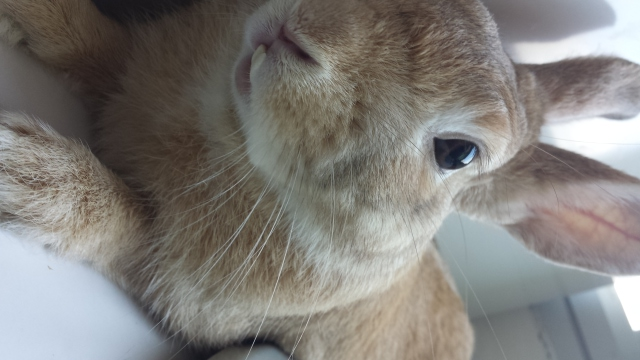 RE: Rabbit teeth
Question
rabbit rabbit 2
Dear Sir / Mdm
I
RE: Rabbit teeth
Question
rabbit rabbit 2
Dear Sir / Mdm
I
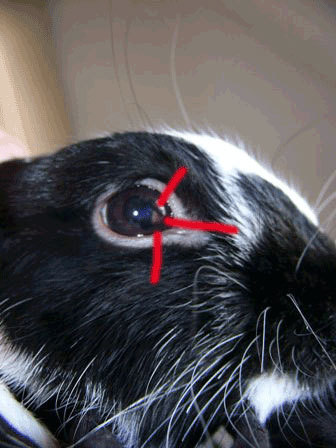 Strange spot in eye + pupil is uneven
QuestionStrange pupil + spot
QUESTION: Hello Dan
Strange spot in eye + pupil is uneven
QuestionStrange pupil + spot
QUESTION: Hello Dan
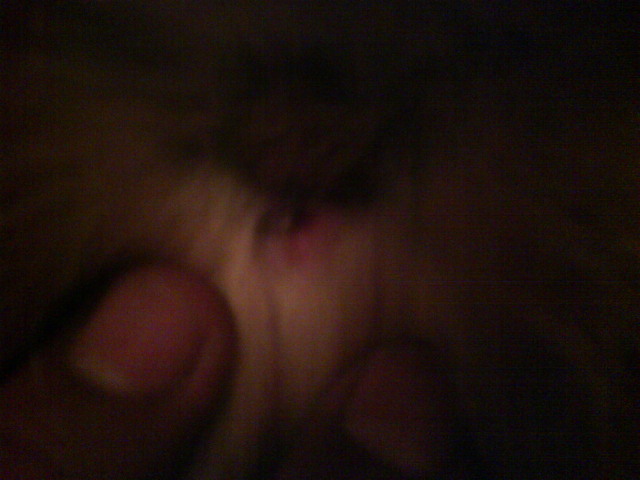 Mini Lop with a bump on his back
Question
small pinkish lump/sca
My mini Lop has a bump
Mini Lop with a bump on his back
Question
small pinkish lump/sca
My mini Lop has a bump
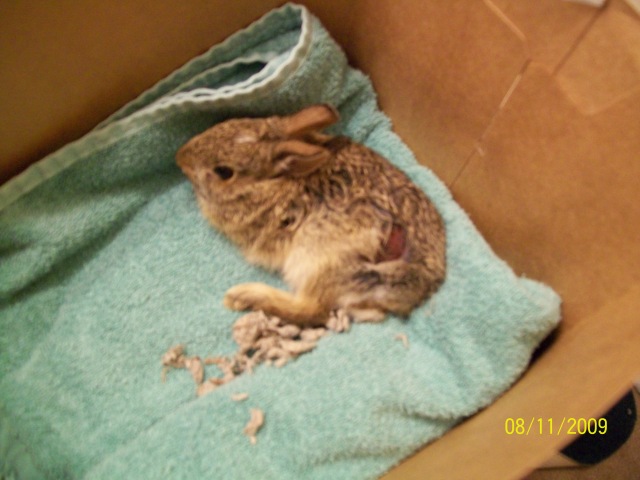 Orphaned and hurt
QuestionQUESTION: Hi i have 3 outside labs and by natur
Orphaned and hurt
QuestionQUESTION: Hi i have 3 outside labs and by natur
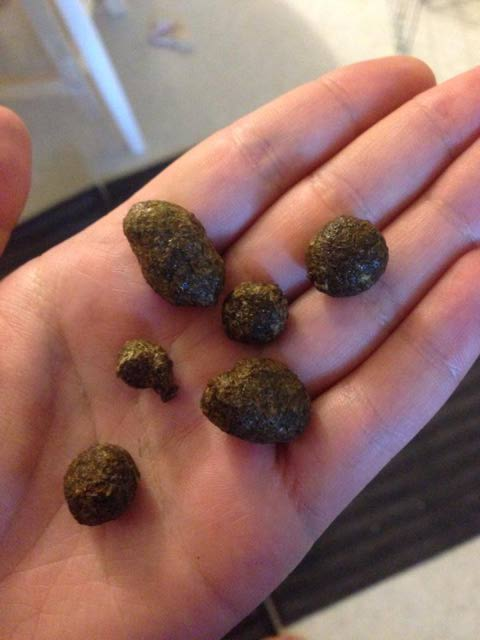 Young rabbits irregular poops
QuestionPoops
QUESTION: Hello!
Im stumped. My ne
Young rabbits irregular poops
QuestionPoops
QUESTION: Hello!
Im stumped. My ne